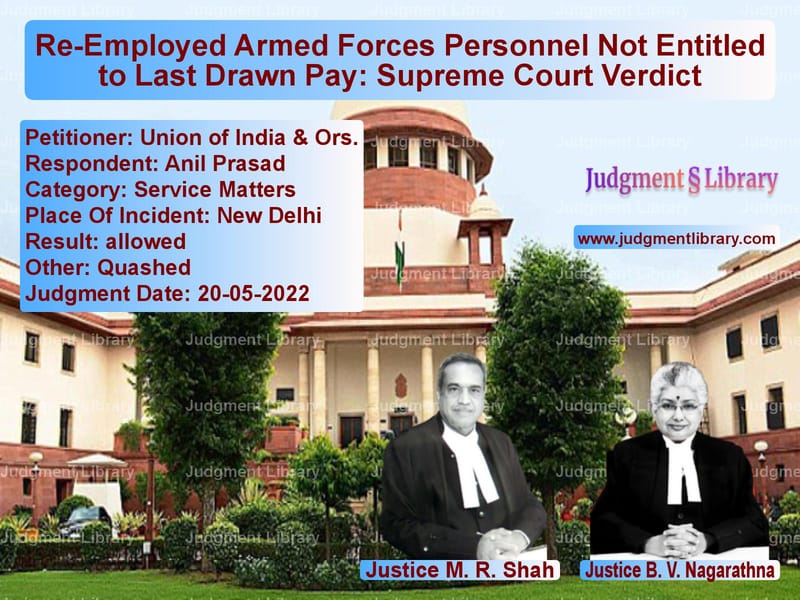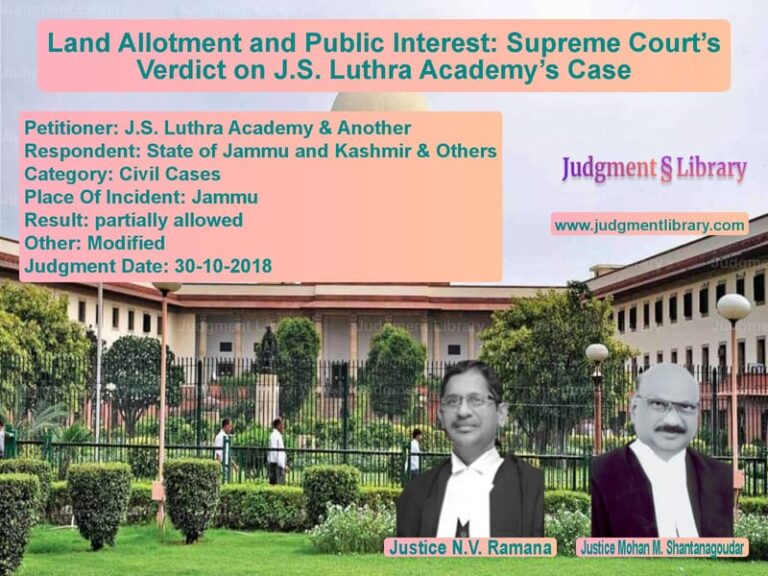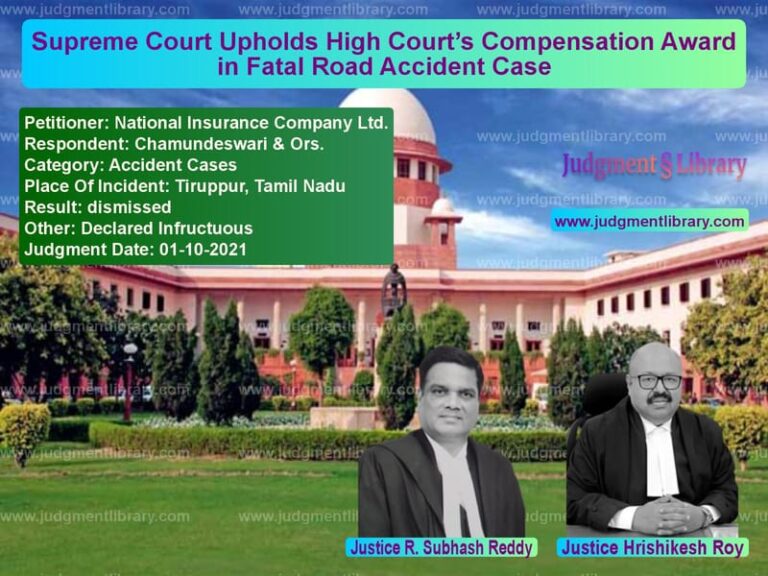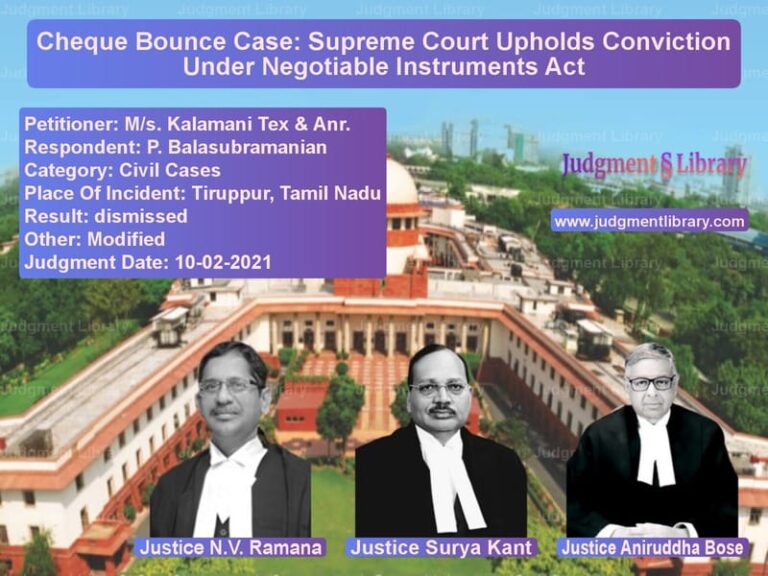Re-Employed Armed Forces Personnel Not Entitled to Last Drawn Pay: Supreme Court Verdict
The Supreme Court of India, in the case of Union of India & Ors. v. Anil Prasad, delivered a crucial judgment on May 20, 2022, clarifying the pay fixation rules for retired Armed Forces personnel upon re-employment in government service. The judgment overturned the Delhi High Court’s decision, ruling that ex-Armed Forces personnel are not entitled to have their last drawn pay protected upon reappointment in a government post.
Background of the Case
Anil Prasad, the respondent, was a former Major in the Indian Army who was discharged from service on July 15, 2007. He later secured a position as an Assistant Commandant (Medical Officer) in the Central Reserve Police Force (CRPF) in 2009. At the time of his discharge from the Army, he was drawing a basic pay of Rs. 28,340 with a grade pay of Rs. 6,600.
Upon his appointment in the CRPF, his pay was fixed at Rs. 15,600 – 39,100 with a grade pay of Rs. 5,400, which was lower than his last drawn pay in the Army. He filed a representation seeking pay protection under Para 8 of the Central Civil Services (Fixation of Pay of Re-employed Pensioners) Order, 1986 (CCS Order). His representation was rejected, leading him to file a writ petition before the Delhi High Court.
The Delhi High Court ruled in favor of Anil Prasad, holding that he was entitled to have his last drawn pay protected upon re-employment in government service. Aggrieved by this decision, the Union of India appealed to the Supreme Court.
Government’s Arguments
The Union of India contended the following:
- Para 8 of the CCS Order does not provide for pay protection upon re-employment.
- The provision only allows for advance increments based on years of service in the Armed Forces, but does not guarantee that the last drawn pay will be maintained.
- Fixing the re-employed person’s pay at their last drawn salary would violate the statutory provisions of the CCS Order.
Arguments by the Respondent (Anil Prasad)
Anil Prasad, represented by his counsel, argued:
- As per Para 8 of the CCS Order, his pay upon re-employment should have been protected and fixed at Rs. 28,340 with a grade pay of Rs. 6,600.
- Since he had served in the Armed Forces for six years, he was entitled to six advance increments, which should have been computed based on his last drawn pay.
- His grade pay was wrongly fixed at Rs. 5,400 instead of Rs. 6,600.
Supreme Court’s Analysis and Ruling
The Supreme Court examined Para 8 of the CCS Order, which states:
“Emergency Commissioned Officers and Short Service Commissioned Officers who join government service will be granted advance increments equal to the completed years of service rendered by them in the Armed Forces on a basic pay equal to or higher than the minimum of the scale attached to the civil post. However, the pay so arrived at should not exceed the basic pay last drawn by them in the Armed Forces.”
The Court interpreted this provision and concluded:
- Re-employed Armed Forces personnel are eligible for advance increments based on their years of service, but their pay must be fixed with reference to the scale attached to the civil post they are appointed to.
- There is no entitlement under Para 8 of the CCS Order to have the last drawn pay in the Armed Forces automatically protected.
- The reference to the last drawn pay in the Armed Forces is only meant to ensure that the computed pay in the civil post does not exceed the last drawn pay, but it does not mean that the last drawn pay must be maintained.
- Since Anil Prasad was placed in the same pay scale as his previous position (Rs. 15,600 – 39,100) and was granted six advance increments, his pay fixation was found to be legally valid.
Based on this reasoning, the Supreme Court ruled that the Delhi High Court had misinterpreted the law and that re-employed Armed Forces personnel are not entitled to have their last drawn pay fixed as their new salary in government service.
Key Takeaways from the Judgment
- The CCS Order does not guarantee that the last drawn pay in the Armed Forces will be retained upon re-employment in government service.
- Advance increments may be granted based on years of service, but the final pay is determined based on the civil post’s pay structure.
- Re-employed Armed Forces personnel must accept the pay structure of the new role and cannot demand pay protection as a right.
Conclusion
The Supreme Court’s ruling sets a clear precedent for cases involving pay fixation for re-employed Armed Forces personnel. It establishes that while ex-servicemen are entitled to certain benefits upon reappointment, they do not have an automatic right to retain their last drawn pay. This judgment ensures consistency in government pay policies while balancing the need for fairness to re-employed personnel.
Petitioner Name: Union of India & Ors..Respondent Name: Anil Prasad.Judgment By: Justice M. R. Shah, Justice B. V. Nagarathna.Place Of Incident: New Delhi.Judgment Date: 20-05-2022.
Don’t miss out on the full details! Download the complete judgment in PDF format below and gain valuable insights instantly!
Download Judgment: union-of-india-&-ors-vs-anil-prasad-supreme-court-of-india-judgment-dated-20-05-2022.pdf
Directly Download Judgment: Directly download this Judgment
See all petitions in Pension and Gratuity
See all petitions in Employment Disputes
See all petitions in Public Sector Employees
See all petitions in Judgment by Mukeshkumar Rasikbhai Shah
See all petitions in Judgment by B.V. Nagarathna
See all petitions in allowed
See all petitions in Quashed
See all petitions in supreme court of India judgments May 2022
See all petitions in 2022 judgments
See all posts in Service Matters Category
See all allowed petitions in Service Matters Category
See all Dismissed petitions in Service Matters Category
See all partially allowed petitions in Service Matters Category







